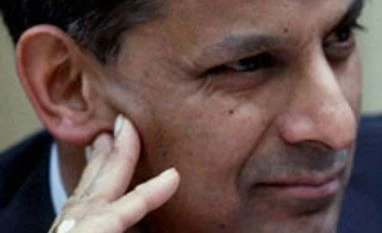“There is no fundamental reason for volatility in the value of the rupee. At some time, it makes sense to take a deep breath and examine the fundamentals,” Rajan said at a hastily arranged media briefing, an unprecedented departure for the traditionally cautious central bank.
Asking the market to “worry about the right things and not get into a tizzy about the wrong ones”, Rajan expressed comfort about core inflation and highlighted the narrowing current account deficit. Most immediately, he pledged to move slowly, if needed, in winding down an oil window for providing dollars directly to state-run oil companies, while announcing a Rs 8,000-crore bond sale on Monday to inject liquidity into the market. (RAJAN'S PRESCRIPTION)
Also Read
Having recovered from an all-time low at the end of August, the rupee has again begun to slide against the US dollar in recent weeks. It hit its lowest level in two months during volatile trading on Wednesday morning.
Rajan-speak, however, had a mixed impact on markets — the benchmark 10-year bond prices went rallying but the rupee failed to gain much and closed only a little higher than the low hit earlier. While the benchmark 10-year bond yields slumped 13 basis points to 8.92 per cent, marking the biggest fall in five weeks, the rupee strengthened to 63.31 a dollar from an intra-day low of 63.91 and the previous day’s close of 63.71. In the past five trading days, the Indian currency had depreciated 3.36 per cent against the dollar.
Though he termed food inflation “worryingly high”, the governor said he was comforted by a downward trend in the core CPI.
He also painted a rosy picture on the external front — a key reason for the currency’s weakness — and said the current account deficit would be $56 billion, or less than three per cent of gross domestic product (GDP), for the current financial year. This was broadly in line with what Finance Minister P Chidambaram has been saying.
Rajan said he remained “concerned” about the weak economy but expected higher consumption following a good monsoon. He also said an increase in exports would boost growth in the second half of the financial year. Rajan said RBI had allowed state-run oil companies to start purchasing dollars from markets but would not rush the process of tapering its dollar-swap window for these companies. “We will choose the most appropriate solution to settling the dollar swaps with oil companies, when the time comes,” he said.
The governor also cited the option of rolling over some portion of oil companies’ dollar swaps, if market conditions were not stable.
He also gave detailed reasons why fears about foreign investors pulling out from the country were unfounded. According to Rajan, the country last year saw $26-billion FII inflows (both debt and equity). “Let me assume that we get no inflows this year; and, in fact, outflows equal the inflows we got last year. In other words, there is $52 billion in FII flows. Remember that we have $32 billion less of CAD to finance this year and we have raised, till yesterday, $18 billion through new channels. So, if other financing remains the same as last year, which it seems on track for, even if foreign investors pull out significantly more money this year than they have so far, we still can break even on capital flows,” Rajan said.
Experts, however, said despite the positive words, volatility in the rupee might continue in the near term. “The volatility will continue as the demand for dollars from oil marketing companies keeps coming more into the market and RBI will have to keep intervening by selling dollars. The volatility will especially be more on days when there are sudden dollar demands,” said Mecklai Financial Deputy CEO Partha Bhattacharya.
“Government bond yields may remain stable tomorrow. But the data for wholesale inflation rate, based on the Wholesale Price Index are due on Thursday. If inflation climbs up, yields may again rise,” said Baljinder Singh, government bonds dealer at Andhra Bank.
)